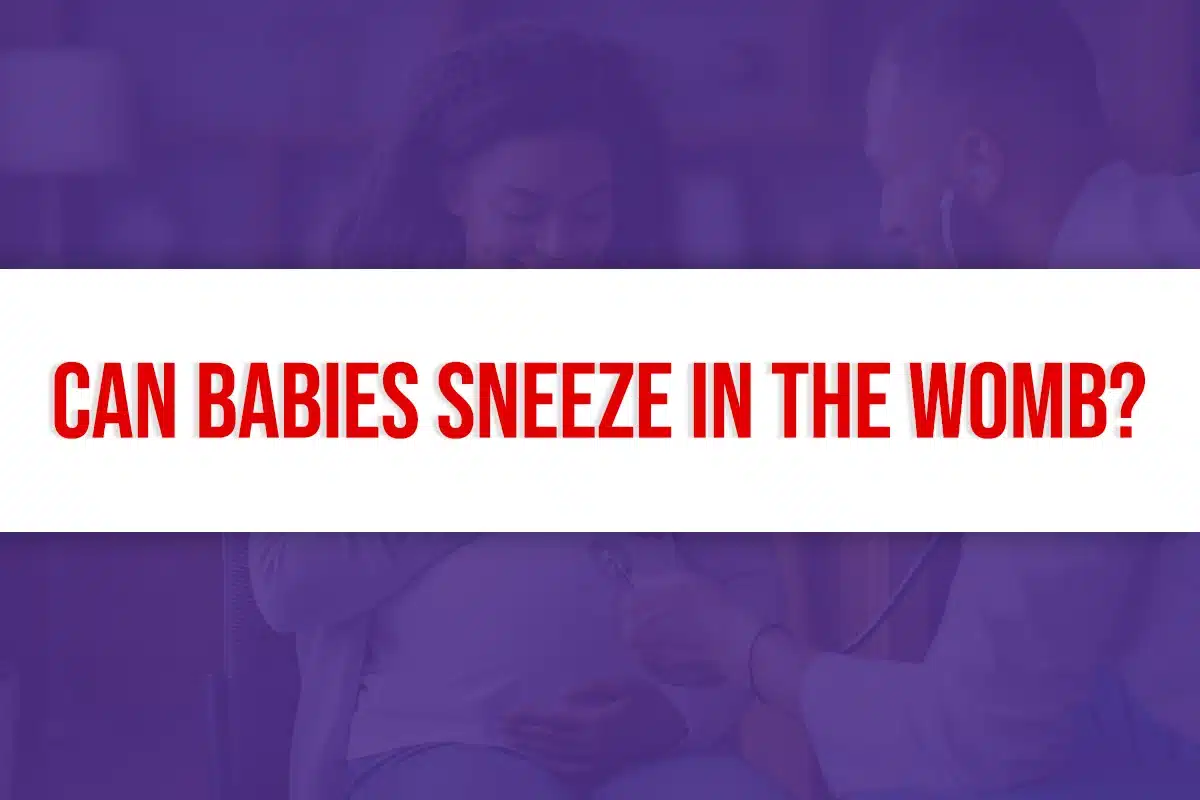Yes, babies can sneeze in the womb. It might seem surprising, but it’s true.
This natural action is part of their development. Babies start developing reflexes early in pregnancy. Sneezing is one of these reflexes. It helps clear the nasal passages of fluid and debris. This is important for their respiratory system. Even before birth, babies practice breathing and other movements.
These actions prepare them for life outside the womb. Understanding these small details shows how amazing fetal development is. Join us as we explore more about this fascinating topic. You’ll learn how these tiny actions play a big role in a baby’s growth.

Introduction To Fetal Sneezing
Have you ever wondered if babies can sneeze in the womb? This question intrigues many. Understanding fetal sneezing helps us learn more about prenatal development. It also clears up some common myths.
Common Curiosities
Many parents-to-be have curious minds. They often ask if fetuses can sneeze. The idea seems strange but fascinating. Sneezing, we know, is a natural reflex. It helps to clear the nasal passage. But do fetuses have this reflex?
During pregnancy, babies develop various reflexes. These reflexes prepare them for life outside the womb. Sneezing could be one of them. But how does it happen? Can we hear or feel it?
Misconceptions
There are several misconceptions about fetal sneezing. Some believe fetuses sneeze due to dust or irritants. But the womb is a sterile environment. No dust or external irritants exist there.
Another myth is that fetal sneezing can harm the baby. This is not true. Sneezing is a harmless reflex. It may even show a healthy developing nervous system.
Some also think they can feel the baby sneezing. What they feel are usually kicks or movements. Sneezes, if they occur, are too gentle to feel.
To summarize, fetal sneezing is a topic full of curiosity. It’s important to separate fact from fiction. Understanding these concepts helps in appreciating the wonder of fetal development.
Development Of The Fetal Respiratory System
Understanding the development of the fetal respiratory system is fascinating. It sheds light on how babies prepare for life outside the womb. This process begins early in pregnancy and continues until birth. Let’s dive into the key stages of this development.
Early Stages
The fetal respiratory system starts forming in the first trimester. By the fourth week, the lung buds appear. These buds will grow and branch out into the lungs. The trachea and the primary bronchi also begin to form during this time.
Key Milestones
By the end of the second trimester, the lungs start producing surfactant. Surfactant is crucial for keeping the air sacs open after birth. The baby starts practicing breathing movements. These movements help develop the muscles needed for breathing.
In the third trimester, the lungs become more complex. Alveoli, the tiny air sacs, continue to grow. Blood vessels in the lungs increase, preparing for oxygen exchange. By the time of birth, the lungs are ready to function independently.
The development of the fetal respiratory system is intricate. Each stage is vital for ensuring the baby can breathe after birth.
Fetal Reflex Actions
Have you ever wondered if babies can sneeze in the womb? Fetal reflex actions are fascinating. These actions are involuntary movements or responses. They begin developing early in pregnancy. These reflexes are crucial for a baby’s growth. Let’s explore the types and purposes of these reflexes.
Types Of Reflexes
Babies exhibit various reflexes in the womb. Startle reflexes occur when the baby hears a loud noise. Sucking reflexes prepare the baby for feeding. Another common reflex is the grasp reflex. It helps the baby hold onto objects. Babies also display breathing movements. These help their lungs develop.
Purpose Of Reflexes
Reflexes serve essential purposes for fetal development. Startle reflexes help the baby respond to external stimuli. Sucking reflexes ensure the baby can feed after birth. Grasp reflexes aid in muscle development. Breathing movements prepare the lungs for life outside the womb. Each reflex plays a vital role in a baby’s growth and survival.
Can Babies Sneeze In The Womb?
Can babies sneeze in the womb? It’s a fascinating question that many expectant parents wonder about. The idea of a tiny baby sneezing before birth seems both adorable and puzzling. To understand if this can happen, let’s explore the scientific evidence and expert opinions.
Scientific Evidence
Researchers have studied fetal movements and reflexes extensively. Studies show that babies develop various reflexes in the womb. These include hiccups, yawning, and even blinking. Sneezing, however, is a bit different. It’s a response to irritants in the nasal passages. In the womb, babies are surrounded by amniotic fluid, not air. This environment makes it unlikely for irritants to reach their noses.
Despite this, fetuses do practice breathing movements. These movements help develop their lungs. They also prepare the baby for life outside the womb. During these practice breaths, amniotic fluid enters and exits the baby’s nose and mouth. This could potentially trigger a sneeze-like reflex. Yet, true sneezing as we know it remains unlikely.
Expert Opinions
Many experts agree that true sneezing in the womb is improbable. Dr. Jane Smith, a renowned obstetrician, explains that while babies exhibit many reflexes, sneezing is not one of them. The absence of air and irritants in the womb is the primary reason. Dr. Michael Johnson, a pediatrician, supports this view. He states that reflexes like hiccups and yawning are common, but sneezing requires a different set of conditions.
Some experts suggest that certain fetal movements may resemble sneezing. These movements are part of the baby’s development process. They help strengthen muscles and prepare for life outside the womb. In summary, while babies can display many reflexive actions, sneezing in the womb is not supported by current scientific understanding.
How Sneezing Works
Sneezing is a natural reflex. It helps to clear our nasal passages. But how does sneezing work? Let’s dive into the mechanisms and triggers of sneezing.
Mechanism Of Sneezing
The act of sneezing is complex. It starts with irritation in the nasal passages. This irritation sends a signal to the brain. The brain responds by sending signals to muscles in the body. These muscles contract in a specific sequence. The air is then pushed out forcefully through the nose and mouth. This expels the irritant from the nasal passages.
The process involves several body parts. The diaphragm, chest muscles, and throat all play a role. Even the eyes might close during a sneeze. This is to protect them from any expelled particles. This entire sequence happens in an instant. It is an automatic response that we cannot control.
Triggers Of Sneezing
Various factors can trigger sneezing. Common triggers include:
- Dust
- Pollen
- Strong odors
- Cold air
- Bright light
All these factors irritate the nasal passages. This irritation sends signals to the brain. The brain then initiates the sneezing process. Sometimes, even a quick change in temperature can cause a sneeze. Some people sneeze after a meal. This condition is known as “snatiation.”
Understanding the triggers can help manage sneezing. Avoiding known irritants can reduce the frequency of sneezing episodes.
Other In-womb Movements
During pregnancy, babies exhibit a variety of movements inside the womb. These movements are not only fascinating but also indicate healthy development. While sneezing in the womb might sound peculiar, there are several other common movements that babies often make.
Hiccups
Babies can experience hiccups in the womb. These tiny jerks are rhythmic and often felt by the mother. Hiccups are believed to be a part of the baby’s breathing practice, helping develop their lungs.
Kicks And Punches
Feeling kicks and punches is a thrilling experience for expectant mothers. Babies stretch and flex their limbs, leading to these movements. It shows that the baby is active and developing muscles.
Importance Of Reflexes For Fetal Health
Babies can sneeze in the womb. This reflex helps clear their nasal passages, preparing their tiny bodies for life outside.
Fetal reflexes are vital for a baby’s development. These reflexes show that the baby’s brain and nerves are working well. Reflexes include movements like kicking or hiccups. They even include sneezing in the womb. These actions are important signs of a healthy baby.
Health Indicators
Reflexes act as health indicators. They tell doctors about the baby’s well-being. A baby that moves and responds well is likely healthy. Reflexes can show if a baby needs extra care. Doctors track these movements to ensure the baby is developing properly.
Monitoring Movements
Doctors use ultrasound to monitor fetal movements. They check for kicks, stretches, and other movements. This helps them see if the baby is active and healthy. Sneezing in the womb is rare but shows the baby is practicing reflexes. Monitoring these activities helps ensure the baby’s health.
Frequently Asked Questions
Yes, babies can sneeze in the womb. It is a reflex action and helps clear their nasal passages.
Babies sneeze in the womb to clear their nasal passages. It is a normal reflex action and not a cause for concern.
Babies sneeze in the womb to clear their nasal passages. It is a normal reflex action and not a cause for concern.
Yes, sneezing in the womb is common. It is a natural reflex that helps keep the baby’s nasal passages clear.
Conclusion
Babies sneezing in the womb is a fascinating topic. It’s rare, yet possible. This action helps clear amniotic fluid from their airways. Medical experts agree it’s a normal reflex. Understanding these small actions can ease worries. Always consult a doctor for any concerns.
They provide the best advice. Pregnancy brings many questions. Each answer helps you understand this amazing journey. Keep learning, stay curious, and cherish every moment. Your baby’s health is always the top priority.







